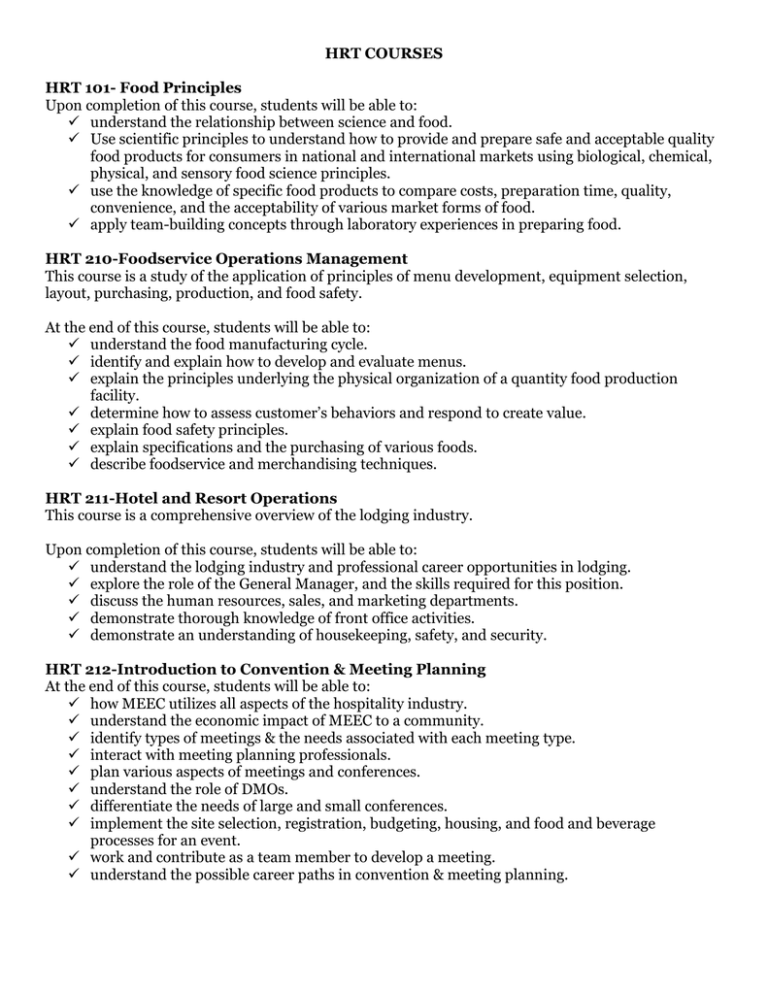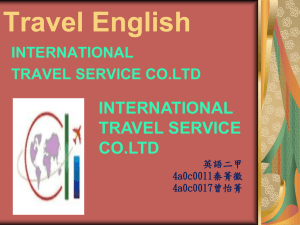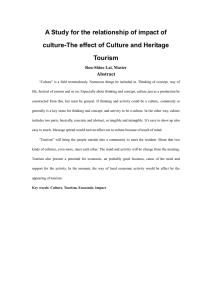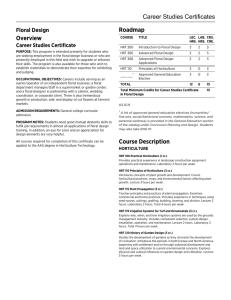HRT COURSES HRT 101- Food Principles Upon completion of this
advertisement

HRT COURSES HRT 101- Food Principles Upon completion of this course, students will be able to: understand the relationship between science and food. Use scientific principles to understand how to provide and prepare safe and acceptable quality food products for consumers in national and international markets using biological, chemical, physical, and sensory food science principles. use the knowledge of specific food products to compare costs, preparation time, quality, convenience, and the acceptability of various market forms of food. apply team-building concepts through laboratory experiences in preparing food. HRT 210-Foodservice Operations Management This course is a study of the application of principles of menu development, equipment selection, layout, purchasing, production, and food safety. At the end of this course, students will be able to: understand the food manufacturing cycle. identify and explain how to develop and evaluate menus. explain the principles underlying the physical organization of a quantity food production facility. determine how to assess customer’s behaviors and respond to create value. explain food safety principles. explain specifications and the purchasing of various foods. describe foodservice and merchandising techniques. HRT 211-Hotel and Resort Operations This course is a comprehensive overview of the lodging industry. Upon completion of this course, students will be able to: understand the lodging industry and professional career opportunities in lodging. explore the role of the General Manager, and the skills required for this position. discuss the human resources, sales, and marketing departments. demonstrate thorough knowledge of front office activities. demonstrate an understanding of housekeeping, safety, and security. HRT 212-Introduction to Convention & Meeting Planning At the end of this course, students will be able to: how MEEC utilizes all aspects of the hospitality industry. understand the economic impact of MEEC to a community. identify types of meetings & the needs associated with each meeting type. interact with meeting planning professionals. plan various aspects of meetings and conferences. understand the role of DMOs. differentiate the needs of large and small conferences. implement the site selection, registration, budgeting, housing, and food and beverage processes for an event. work and contribute as a team member to develop a meeting. understand the possible career paths in convention & meeting planning. HRT 224-Tourism Management This course explores the various components of the tourism industry, to include: travel motivations, market segments, and economic, social, cultural, and environmental analyses. At the end of this course, the student will be able to: state the various definitions of tourism. discuss the history and development of tourism. identify the different types of tourism organizations and their functions. measure how & why tourists travel. evaluate how international tourism can contribute to world peace. use mathematical formulas to estimate future demand. explain the economic impacts of tourism. conduct research using literature reviews and survey methods to address current issues in tourism. discuss sustainable tourism. identify the major global forces impacting tourism & shaping its future. HRT 311-Human Resources Management in the Services Industry This course is to introduce students to the core concepts of managing an organization’s human assets as a frontline manager. Upon completion of this course, students will be able to: develop a plan to recruit a pool of diverse qualified candidates for a job vacancy. use a standard selection process to identify the best qualified candidate for a job vacancy. develop a list of questions to ask in an interview that complies with employment law. identify the key components of an effective training program. follow an approved process for providing developmental feedback to direct reports. properly evaluate employee performance. use progressive discipline to solve employee performance problems. properly conduct an investigation. identify the key components of essential employment laws. properly delegate tasks to a direct report. identify the key components of sexual harassment, and how to conduct a proper sexual harassment investigation. differentiate between diversity and affirmative action, and understand the contributions of each to the effective performance of an organization. HRT 326-Food & Lodging Cost Control This course is designed to teach students how to use budgets, cost analyses, and computerized financial statements in decision-making in lodging & foodservice organizations. Upon successful completion of this course, students will be able to: distinguish between cost control and cost reduction. define and give examples of applications of the 4 Faces of Food Cost. define and apply effective menu design techniques for effective cost control, merchandising, and effective communication. calculate, plot, and interpret menu sales using the cost/margin method. contrast objective and subjective menu pricing methods. define the strategies that optimize menu items through pricing, placement, and menu design. describe the elements, benefits, and values of effective inventory procedures. describe the elements of effective purchasing, receiving, storage, and issuing for effective cost control. describe the elements and benefits of sales analyses relative to forecasting. describe when & why the seven types of scheduling techniques should be used. evaluate employee productivity using qualitative and quantitative measures. apply alcoholic beverages cost control techniques. describe the three liquor control methods. determine how to assess the proper number of beer, wine, & spirits types to keep in inventory. describe the most common types of liquor fraud and how to prevent them. HRT 330-Working with Diversity This course is designed to provide students with a basis for improved understanding and ability to effectively manage a diverse service workforce. The course explores the historical, psychological, and sociological perspectives of diversity. At the end of this course, students will be able to: better understand themselves, their attitudes, and emotions around diversity. discuss the dimensions of diversity from historical, psychological and sociological perspectives. articulate the problems & issues associated with managing a diverse workforce, including the organizational benefits of diversity. describe the process of perception and its role in shaping human behavior. develop analytical and diagnostic competencies to become better critical thinkers and problem solvers. HRT 361-Issues & Trends in Consumer Services This course is designed to help students build competencies in providing outstanding customer service in retail organizations. At the end of this course, students will be able to: better understand the approach to customer service recognize the importance of store environment planning, organizational policies, and internal marketing. learn how to increase business by attracting and retaining desired customers




